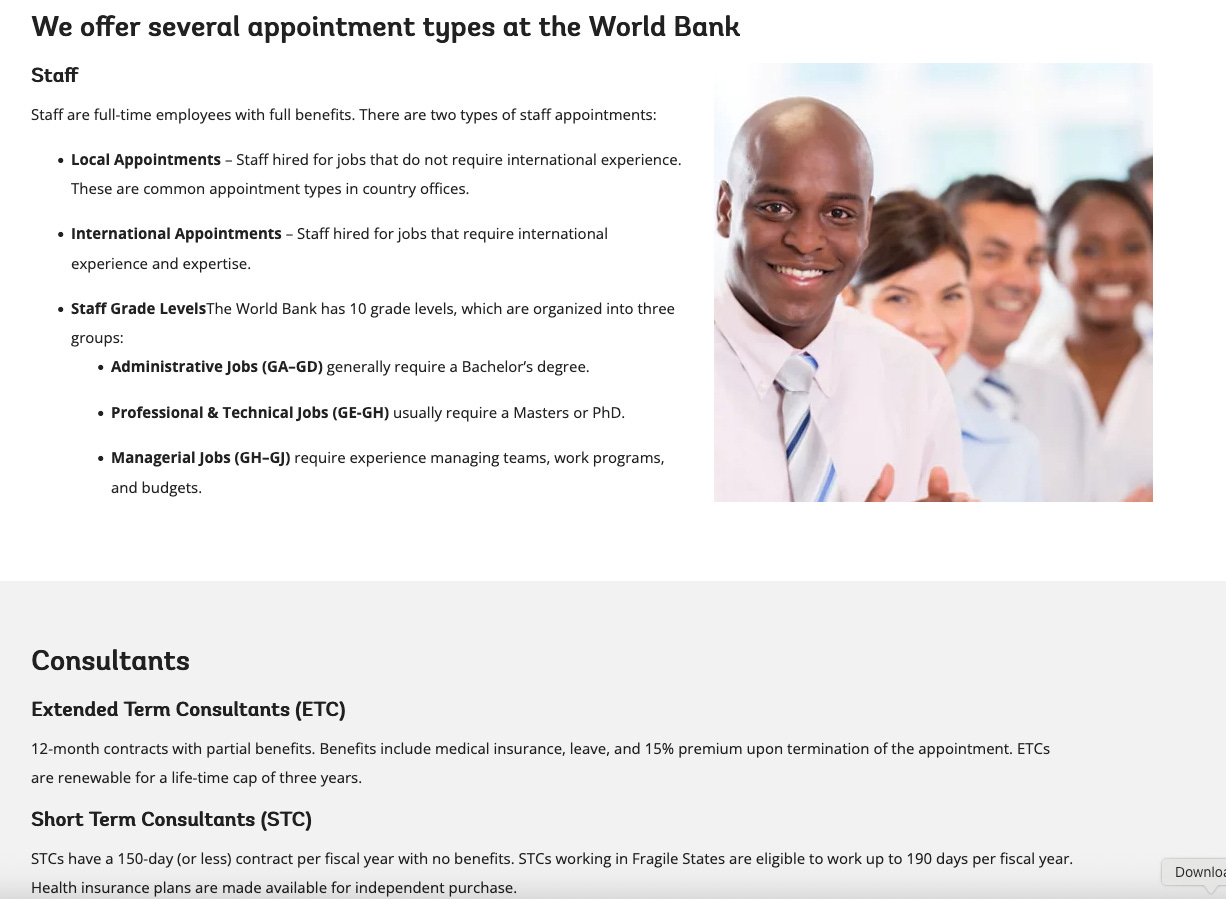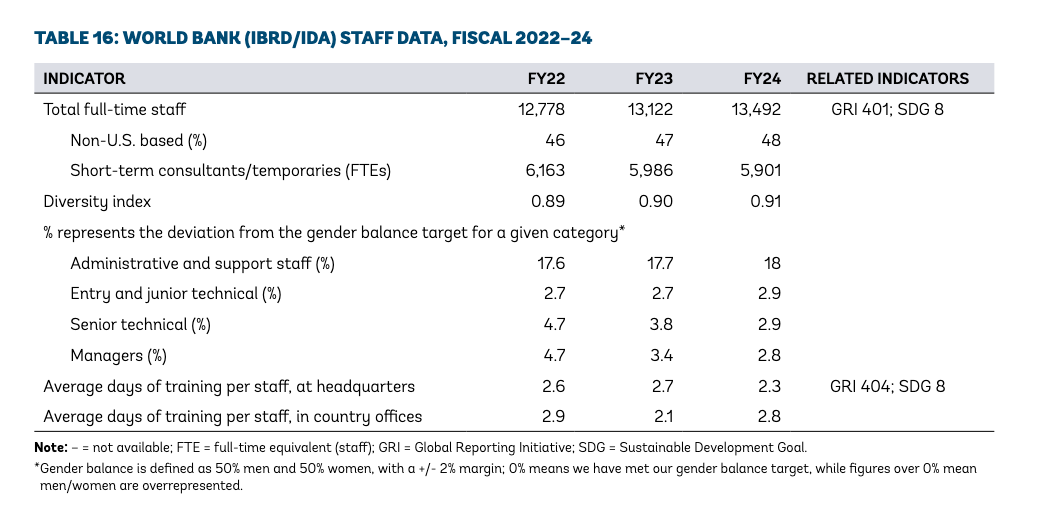MDB Consultant vs Full-Time Employee: The Real Financial and Career Trade-offs
Flexibility, Pay, and Career Paths: Choosing Between Consultant and Staff Roles at Development Banks
If you’re weighing whether to pursue MDB consulting or go for a permanent staff position, you’re facing one of the most consequential career decisions in development finance.
Having analyzed compensation data and career trajectories across major MDBs, I'll break down exactly what you're signing up for with each path.
Let’s go.
The Money Conversation: What You'll Actually Make
Consultant Daily Rates
MDB consultants typically earn between $200-800 per day, with significant variation based on experience and location. Entry-level consultants with master's degrees start around $200-300 daily. Mid-career professionals with 5-10 years command $350-650. Senior experts with specialized skills can reach $800 or higher.
But there is a catch for some MDBs like the World Bank: you're capped at 150 days per year for short-term consultancies. Do the math: at $400/day for 150 days, that's $60,000 gross. No benefits. No paid time off.
However, other MDBs, like ADB, don’t have this 150 day limit.
Full-Time Compensation
Staff positions offer comprehensive packages competitive with the private sector. The base salary comes tax-free in many member countries (though U.S. citizens still pay). Add medical insurance, life insurance, disability coverage, retirement contributions, and 26 vacation days plus holidays.
A mid-level professional role typically starts at $80,000-120,000 base, but the total compensation package can effectively double that figure when you factor in benefits.
I actually provide a full breakdown of MDB staff salaries here, if you’re interested:
MDB Salaries: The Numbers You Want to See
Trying to figure out what multilateral development banks (MDBs) really pay?
The Security Question: Stability vs Flexibility
Life as a Consultant
Consultant contracts run project to project. You might have steady work for six months, then nothing for two. From experience, I can tell you this feast-or-famine cycle demands a bit of financial planning.
The upside? Complete control over your schedule. Work intensively for four months, then take two months off. Choose projects that interest you. Say no to assignments in challenging locations. I can’t complain about the flexibility.
Staff Positions
Full-time roles provide predictable income and career progression. You'll advance through clearly defined grades with regular performance reviews and salary adjustments.
The downside? Less flexibility and less project variety. You're assigned based on organizational needs, not personal preference. International assignments become obligations, not options - particularly at the World Bank, where you’re expected to change jobs (and potentially locations) every 4 years.
Tax Reality Check: What Actually Hits Your Bank Account
Consultant Tax Burden
As an independent contractor, you're responsible for:
Self-employment tax (15.3% in the U.S.)
Federal and state income tax
Quarterly estimated payments
Your own retirement savings
That $400 daily rate? After self-employment tax, federal tax, and state tax, you might keep $250-280. And you still need health insurance.
However, if you come from other countries like Germany, France, Austria, etc. then these MDB consultant payments may also be considered tax free.
Employee Tax Advantages
Many MDBs offer tax-free salaries for non-U.S. citizens. Even U.S. citizens benefit from tax equalization policies and foreign earned income exclusions for overseas assignments.
The organization handles tax withholding, provides tax preparation assistance, and often covers additional tax burdens for international assignments.
Career Progression: The Long Game

Consultant Career Path
Most consultants view MDB work as either:
A stepping stone to full-time positions
Part of a portfolio career mixing different clients
Most staff start their career in MDBs as short- or long-term consultants. The typical progression involves building relationships, proving your value on multiple assignments, then applying when positions open.
However, there's no guarantee. Some consultants work for years without landing staff positions. Age matters too—the median age of the staff is around 42 years old at major MDBs.
Staff Career Development
Employees follow structured advancement:
Entry level analyst (2-3 years)
Mid-level specialist (3-5 years)
Senior specialist (5-10 years)
Principal/Lead specialist (10+ years)
Management roles
Each level brings increased responsibility, higher compensation, and often international leadership opportunities.
The Hidden Costs Nobody Mentions
Consultant Expenses
Budget for:
Health insurance ($500-2000/month)
Retirement savings (no employer match)
Professional liability insurance
Home office setup and maintenance
Accounting/tax preparation fees
Unpaid time between contracts
Employee Trade-offs
Consider:
Limited geographic flexibility
Bureaucratic constraints
Slower decision-making processes
Mandatory rotation policies
Political dynamics in international organizations
Project Variety: Breadth vs Depth
Consultant Advantages
Consultants often work across multiple sectors and regions. You might evaluate education programs in Kenya one month, then assess infrastructure financing in Vietnam the next. This variety builds diverse expertise quickly.
You also maintain independence. Disagreements with management? Your contract ends soon anyway. Don't like the organizational culture? You're not stuck. Plus, you get to do fun side projects like this while you’re at it.
Staff Benefits
Employees develop deep institutional knowledge and lasting relationships. You see projects through from conception to completion, sometimes over several years.
Staff also access internal resources, training programs, and global networks that consultants can't fully leverage.
Making the Decision: Key Considerations
Choose Consulting If:
You value flexibility over security
You have strong financial discipline
You're building diverse experience
You can handle income uncertainty
You're testing MDB work before committing
Choose Staff Positions If:
You want predictable career progression
Benefits matter as much as salary
You're ready for long-term commitment
You value institutional influence
You have family obligations requiring stability
The Hybrid Approach
Many professionals combine both approaches throughout their careers. Start as a consultant to gain experience and connections. Transition to staff for stability and growth. Return to consulting later for flexibility and higher daily rates.
Some maintain consulting work on the side to supplement income and keep options open.
And there will be plenty of opportunities for you.
For example, at the World Bank, there are about 13,000 World Bank full-time staff, and about 6,000 short term consultants. There are also many more individuals who are employed through firms as consultants.

Bottom Line
Neither path is universally better.
Consulting offers freedom and potentially higher gross earnings but requires managing your own benefits and weathering uncertainty. Staff positions provide comprehensive benefits and clear advancement but limit flexibility.
The smartest approach could be to start with short-term consultancies to test the waters. Build your network, understand the culture, and position yourself for either path. Most successful MDB professionals have experience with both models.
Remember, competition for long-term jobs at MDBs can be pretty fierce at time, but there is always a need for consultants. As many MDB folks do, you can use consulting as your entry point, then decide based on actual experience rather than assumptions.
Make sure you subscribe to MDB Jobs to get the latest vacancies delivered straight to your inbox each week.








Hi Rob! I sent you a direct message, in case you missed it